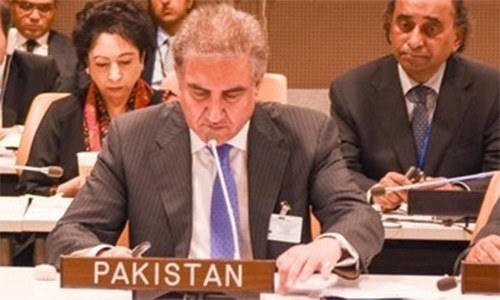WASHINGTON: UN Secretary General António Guterres warned on Tuesday the world against rising tensions between nuclear-armed states, as a powerful American newspaper pointed out that tensions in Kashmir were more menacing now than ever before as both India and Pakistan possessed weapons of mass destruction.
Also, an international advocacy group — Human Rights Watch — noted that basic freedoms were at risk in the occupied Kashmir where Indian authorities had arrested political leaders and severed communication lines.
As the news of India revoking Kashmir’s special status sank-in, Kashmiris from both sides of the Line of Control gathered at a restaurant near Washington on Monday night to exchange notes on how to contact their relatives trapped in the valley.
“Today, we are sadly witnessing a worsening international security environment,” said the UN Secretary General in his message on the 74th anniversary of the 1945 nuclear attacks on Japan. “Tensions between the nuclear-armed States are rising. The disarmament and arms-control institutions, that have made the world a more secure place for decades, are being called into question,” Mr Guterres warned. The New York Times, in its main editorial piece on Tuesday, directly addressed the threat of a nuclear conflict in South Asia.
“Rival claims to Kashmir have led to two wars and frequent eruptions of violence and terrorism over the past seven decades, made all the more menacing by the nuclear arsenals of India and Pakistan,” it warned.
“The Indian government’s decision to revoke the semi-autonomous status of Kashmir, accompanied by a huge security clampdown, is dangerous and wrong. Bloodshed is all but certain, and tension with Pakistan will soar.”
The newspaper reminded the United States, China, the United Nations and other powers with influence over India and Pakistan that they “must urgently do what they can to prevent India’s folly from escalating into a perilous and unpredictable regional crisis.”
The Times also identified Kashmir as “the central source of friction between India and Pakistan and a hotbed of separatist aspirations.”
It noted that after similar tensions, former US president Bill Clinton dubbed Kashmir “the most dangerous place in the world.”
Published in Dawn, August 7th, 2019













































